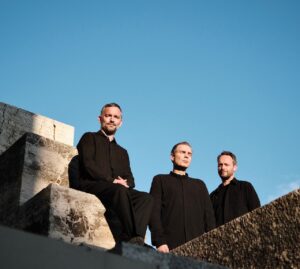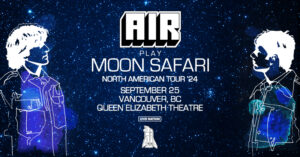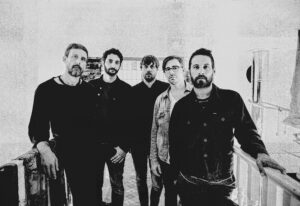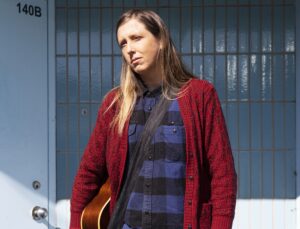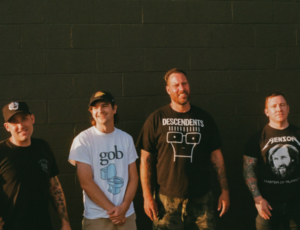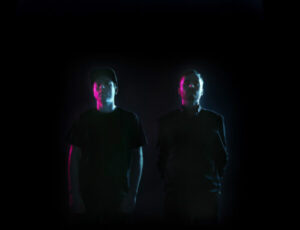It’s August, it’s Friday, and it’s hot. I’ve been doing the rounds at this year’s Squamish Valley Music Festival for the last several hours, so I’m looking forward to the shade that awaits me in the media tent. I walk in to find the Ottawa-based DJ trio commonly known as A Tribe Called Red lounging about, chatting. With their sophomore effort Nation II Nation (2013) getting all sorts of nods (including a spot on this year’s Polaris Music Prize short list), and the group due to play an extended set tonight at the Woodshed stage, things seem to be going pretty well for these innovators of “pow wow step”. Yes, that’s a thing. Look it up, grampa.
I haven’t been allotted very much time to spend with them, unfortunately – I’ve been given a firm 10 minutes – so after a quick introduction, we get right down to it.
Vancouver Weekly: It seems like things have happened very quickly for you guys. I’m sure you guys have been involved in the scene and everything for many, many years, but – debut full-length in 2012, long list Polaris… This year’s album [Nation II Nation], short list, it’s up for contention [for Polaris]… The albums were released almost a year to the day… Is there a third album next year in June?
DJ NDN: [laughs] I don’t know if it’s gonna come in June or May, but there’s definitely one coming, yeah.
VW: Yeah? You’re looking to keep going at that pace for now?
A Tribe Called Red: Yeah, oh yeah.
VW: What are you guys going to do if you, uh… I don’t want to jinx it…
ATCR: Don’t say it. Don’t say it! [laughing]
VW: Okay. Next question… It seems a lot of your subject matter is very sensitive. You guys are very politically conscious, you’re very involved in your communities… And then you have your DJing. How do you manage to marry those ideas, or does it just sort of happen – the party scene, but with that social, political awareness too?
Bear Witness: It comes with the territory. Being aboriginal artists, especially aboriginal artists who draw on our culture to make our art, we have to be responsible to our community. So we have to use that attention we’re getting, that spotlight that we’re getting, to talk about these issues, to start discussion, to try to educate people a little bit about what our experience is in Canada, what our experience is in North America, be it from the communities or the urban settings. It’s just to show people who we are. I don’t think you can split those things up as an aboriginal artist. It’s a luxury we don’t have.
VW: I was just listening to “Electric Pow Wow Drum”. I’ve never seen you guys live and I’m hoping to see you tonight. You guys are shutting down the Woodshed stage, right?
ATCR: Yeah.
VW: You have, what, about a two-hour set?
ATCR: Yeah.
NDN: Which is like, way longer than any other set that we’ve played at a festival so we’re really excited. It’ll give us a lot of freedom to play whatever we want, so we get to be like, for a little bit, the DJs that we are and not just A Tribe Called Red and have that “set” set that we always play. We can play some other music that we really wanna play, which is awesome.
VW: How did you guys get involved with music? Was it all completely isolated or…?
NDN: Yeah, well I grew up in punk bands and stuff, right? I was in like, the Ripcordz out of Montreal and stuff like that, and I actually did a tour with D.O.A., that was wicked. Yeah, then I started working in a club as a bouncer and there was a club night that was going on in Ottawa called Disorganized which is run by Jokers of the Scene. They brought everybody that’s a big name now, as producers; they brought them in years and years ago. I saw like, Flosstradamus basically do a whole mash-up set in a club with like, 300 people, six or seven years ago; now they’re like the “trap gods”.
VW: You got to see that scene just as it was blossoming.
NDN: That’s right, that’s right.
VW: Aboriginal music seems to be naturally leaning towards electronic – it seems like a match made in modern heaven, right? It’s tribal, beat-oriented, people kind of get lost in the beat… and then… like… yeah… As I say that, I completely lost myself in that sentence…
[laughing]
NDN: The thing is that pow wow music is meant to make you dance, right? There’s different tempos for different dances… When you play those beats, it’s commanding a certain dance. Just like club music does. You know, dubstep people know that beat, so they dance a certain way to it, as opposed to like, jungle or anything else. All we really did when we married pow wow music with club music, was we put dance music with dance music. It was a pretty easy fit when we did it.
VW: Is there – specifically with A Tribe Called Red, as a trio – when was that moment when you guys were like, “This is happening! This might happen!” Because it seems like you guys are on a steady incline.
BW: Every day feels like that. [laughs] Every day it’s like “Okay. Okay, we’re here. We’re here, now?” Then something else happens.
NDN: The first one, I think, was when we sent a link to Diplo of “Electric Pow Wow Drum”, and then Diplo was like, “Yo, I’m blogging about this.” And that was it. “Oh my god, he’s going to blog about it!” And then he did, you know, the next day, we’re getting tweets from like, MTV and stuff like that. That was definitely the start of our upward trajectory.
VW: So being in Ottawa, you guys are at the heart of where the big decisions are made. Well… when they’re actually working… But do you find that it’s easier or more difficult to be involved politically because you’re in the heart? Or is there just more bullshit to deal with? Do you feel like you have a bigger voice because you’re in Ottawa?
NDN: Well, it’s kind of like, reciprocated, you know. When we were making Nation II Nation, Idle No More was going on, right, so being a part of that energy that was happening in the city, like those rallies with thousands of people that were coming out, it really, really reflected what we were doing. It really inspired us to make that music. Yeah, that helps a lot, being in Ottawa. Being where all that goes down, that definitely helped a lot.
BW: As a whole, I think being from Ottawa puts us in a real underdog position.
DJ Shub: Yeah, that’s true too.
BW: We’re between Montreal and Toronto, and we constantly hear like, “What? You guys are from Ottawa? This came out of Ottawa?” There’s always a real feeling that all of Ottawa is this stiff, stuffy place, but what people don’t realize is that so much amazing music has come out of the Ottawa scene, it’s just that everybody leaves. It’s because you hit a certain point, you go to Toronto, or you go to Montreal, you go to New York City… but we’ve stayed in Ottawa. That’s, I think, the big difference there, is that we’re still there, so everyone’s having to notice [that we’re from there] now.
VW: Somebody’s gotta build the scene… [I point to them]
[laughs]
BW: There’s a large scene in Ottawa! Now it has to be recognized. And we’re still part of it.
NDN: Hollerado’s from Ottawa, Jokers of the Scene are from Ottawa, the drummer of Arcade Fire’s from Ottawa…
VW: I’m a big fan of Biipiigwan…
NDN: Yeah, yeah, yeah! That’s Musky’s band. Nice.
Shub: There’s a lot of good bands out of Ottawa…
NDN: Today I Caught The Plague which is now called Anthology, they’re touring right now…
The conversation goes on for quite a while, as the laundry list of Ottawa talent grows and grows. We wrap things up as I wish them a happy rest of day and a wicked set tonight, and leave them with a few minutes to breathe before their next interview. The Tribe is in high demand, it seems. And for good reason.



